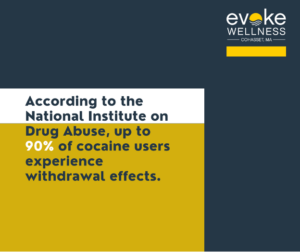As you embark on the difficult but necessary path of cocaine withdrawal, know that you are not alone. An estimated 5.5 million Americans aged 12 and older currently battle cocaine addiction. The good news is that the acute withdrawal period, while intensely unpleasant, only lasts about 1-3 weeks. Being aware of the timeline and common symptoms like depression, fatigue, slowed thinking, anxiety, and drug cravings allows you to understand what to expect during detox. Seeking medical guidance provides additional coping mechanisms to make this initial recovery stage more tolerable. With dedication and support, the first step toward reclaiming your cocaine-free life is within reach. Call us at (617) 917-3485 today or reach out online.
What Are the Symptoms of Cocaine Withdrawal?
Quitting cocaine after prolonged use can trigger unpleasant withdrawal symptoms.
Physical Symptoms
Common physical symptoms include:
- Fatigue and exhaustion
- Sleep disturbances
- Increased appetite
- Muscle aches and pains
- Chills or tremors
Psychological Symptoms
Psychological withdrawal symptoms can be intense, such as:
- Intense drug cravings
- Depression and anxiety
- Irritability and mood swings
- Difficulty concentrating
- Anhedonia (inability to feel pleasure)
The duration and severity varies, but symptoms typically peak within 3-7 days and can last several weeks. Proper medical supervision is recommended to manage withdrawal safely and improve recovery outcomes.
How Long Do Cocaine Withdrawal Symptoms Last?
The Timeline
The duration of cocaine withdrawal symptoms can vary significantly from person to person. Generally, the acute phase lasts between 1-3 weeks. However, psychological cravings and mood disturbances may persist for months after stopping use.
Factors Impacting Duration
Several key factors influence how long withdrawal lasts:
- Amount and frequency of cocaine use
- Method of ingestion (smoking, snorting, injecting)
- Co-occurring substance abuse or mental health issues
- Individual physiology and metabolism
Protracted Withdrawal
For some chronic, heavy users, post-acute withdrawal syndrome (PAWS) can linger for 6 months to 2 years. Symptoms may include:
- Anhedonia (inability to feel pleasure)
- Cognitive impairments
- Sleep disturbances
- Intense drug cravings
Seeking professional addiction treatment is crucial for managing protracted withdrawal safely and increasing chances of sustained recovery.
Is Cocaine Withdrawal Dangerous?
While cocaine withdrawal is extremely uncomfortable, it is not typically life-threatening on its own. However, the psychological distress and intense cravings can indirectly lead to dangerous behavior or health complications. According to the National Institute on Drug Abuse, up to 90% of cocaine users experience withdrawal effects.
Withdrawal Symptoms
The cocaine withdrawal timeline and severity of symptoms depend on the level of use. Common withdrawal effects include:
- Fatigue, lack of pleasure
- Anxiety, irritability, agitation
- Insomnia and nightmares
- Depression, suicidal thoughts
- Strong drug cravings
Risks & Complications
Some potential risks and complications of cocaine withdrawal include:
- Dehydration from vomiting/diarrhea
- Self-harm from depression/psychosis
- Heart issues from increased strain
- Seizures in severe cases
While withdrawal is challenging, proper medical detox and addiction treatment greatly increase the safety and chances of a full recovery. Attempting to quit cocaine alone can be extremely difficult and risky.
Treatment for Cocaine Withdrawal
Seeking professional help is crucial for overcoming cocaine addiction and managing withdrawal symptoms safely.
Medical Detox
In a supervised medical detox program, medications may be prescribed to alleviate severe withdrawal symptoms and cravings. Antidepressants, anti-anxiety drugs, or sleep aids can help stabilize your condition.
Inpatient Rehabilitation
Inpatient or residential treatment provides a supportive, drug-free environment for recovering from cocaine addiction. Intensive individual therapy programs, counseling, and 24/7 care address the physical, psychological, and behavioral aspects of addiction.
Outpatient Programs
For those with milder addictions or after completing inpatient care, outpatient programs offer flexibility through regular therapy sessions and support group meetings. You live at home while receiving ongoing treatment.
Behavioral Therapies
Evidence-based therapies like cognitive behavioral therapy (CBT) and contingency management help modify harmful thoughts and behaviors related to cocaine use. These skills foster long-term recovery.
No single treatment is right for everyone. Work closely with addiction professionals to develop a comprehensive, personalized plan for cocaine withdrawal and sustained sobriety.
Finding Help for Cocaine Addiction and Withdrawal
Seeking professional help is crucial when dealing with cocaine addiction and withdrawal. The road to recovery can be challenging, but with the right support, it is possible to overcome this substance use disorder.
Rehabilitation Programs
Inpatient or outpatient rehabilitation programs offer a structured environment for individuals to receive comprehensive treatment. These programs provide a combination of therapy, counseling, and medical support to address the physical and psychological aspects of addiction.
Support Groups
Joining a support group, such as Narcotics Anonymous (NA), can be invaluable. These groups connect you with others who understand the struggles of addiction and provide a sense of community and accountability throughout the recovery journey.
Professional Counseling
Working with a licensed therapist or counselor who specializes in addiction can help you identify and address the underlying causes of your cocaine use. Cognitive-behavioral therapy (CBT) and motivational interviewing are effective techniques used in addiction treatment.
Remember, seeking help is a courageous step towards reclaiming your life. With determination and the right resources, it is possible to overcome cocaine addiction and withdrawal.
Cocaine Withdrawal Symptoms FAQs
What are common cocaine withdrawal symptoms?
Upon quitting cocaine, users often experience intense cravings, fatigue, depression, anxiety, increased appetite, and difficulty feeling pleasure. Symptoms typically peak within 3-7 days and can last several weeks. However, cravings and mood swings may persist for months.
How long do cocaine withdrawal symptoms last?
The acute withdrawal phase lasts around 1-3 weeks for most users. However, post-acute withdrawal symptoms like cravings, irritability, anhedonia, and sleep disturbances can linger for 6 months or longer. Timeline varies based on factors like addiction severity and frequency of use.
What helps ease cocaine withdrawal symptoms?
Through medication-assisted treatment (MAT), certain medications can help manage specific withdrawal symptoms like depression, anxiety, and cravings. Behavioral therapies, exercise, proper nutrition, and support groups are also beneficial during detox and recovery. Residential treatment programs provide a comprehensive, structured environment.
Conclusion
In summary, if you or a loved one is struggling with cocaine addiction, know that recovery is possible with proper treatment and support. Although withdrawal symptoms can be extremely difficult, they are only temporary. By understanding what to expect during detox and following medical recommendations, the discomfort can be managed. With each day of sobriety, you become stronger and regain control of your life. There are many resources available to guide you through recovery. You have already taken the first step by learning about withdrawal. Now is the time to reach out for help. A brighter future awaits free from addiction. Stay strong and take it one day at a time. There are people ready to help you succeed.
Begin Your Journey with Evoke Wellness at Cohasset
If you or a loved one is considering treatment, Evoke Wellness at Cohasset invites you to contact us. Our compassionate team is ready to answer your questions, discuss your needs, and help you take the first steps toward recovery. In Cohasset, you’ll find more than just a treatment program – you’ll discover a community dedicated to your wellness and success. Together, let’s embrace the journey to recovery and the promise of a new beginning. Call us at (617) 917-3485 today or reach out online.





